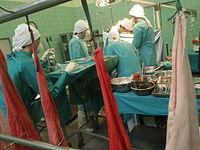
Photo from wikipedia
OBJECTIVE The aim: To study the combination of medical, legal, ethical principles and regulations in the field of transplantology, as one of the key problems of bioethics. PATIENTS AND METHODS… Click to show full abstract
OBJECTIVE The aim: To study the combination of medical, legal, ethical principles and regulations in the field of transplantology, as one of the key problems of bioethics. PATIENTS AND METHODS Materials and methods: Formal-logical methods of analysis and synthesis allowed to reveal the content of the concepts that make up the subject of research, to classify them, as well as to formulate intermediate and general conclusions. The systematic method allowed to study the role and significance of human right to transplantation among other somatic human and civil rights and freedoms. Using the historical method, the doctrinal basis of the study was analyzed, and the main stages of the formation of human right to transplantation were identified. CONCLUSION Conclusions: The level of modern development of the Institute of Transplantology depends primarily on the tolerance of the society itself regarding the concept of brain death. The actual normalization of the concept of death in one or another state determines the level of realization of the human right to organ and tissue transplantation. Regarding the reform of the current legislation in the field of transplantology, as one of the key problems of bioethics, first of all, moral principles should be taken into account (at the same time, today morality in its development is even slightly ahead of the development of international law, although progressive principles of legal regulation of transplantation processes have been distinguished at the international level ). Therefore, during the development of norms of both international and national law regarding transplantology, existing moral principles should be taken as a basis. At the same time, one should not forget that a necessary factor is the presentation of a number of issues for public discussion, as well as their discussion at scientific and practical conferences not only of doctors and lawyers, but also of theologians and philosophers.
Journal Title: Wiadomosci lekarskie
Year Published: 2022
Link to full text (if available)
Share on Social Media: Sign Up to like & get
recommendations!